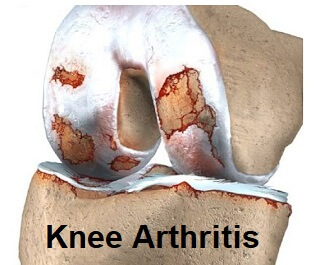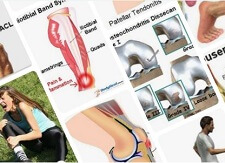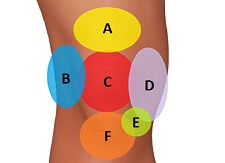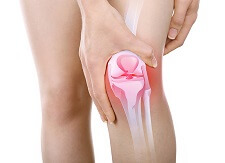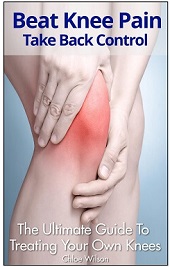- Home
- Knee Symptoms
- Pain At Night
Knee Pain At Night
Written By: Chloe Wilson, BSc(Hons) Physiotherapy
Reviewed by: KPE Medical Review Board
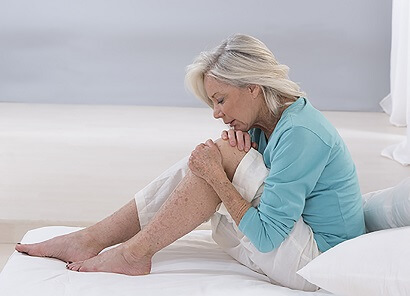
Knee pain at night is a very common problem.
Whether your nocturnal knee pain makes it hard to drop off, wakes you up or leaves you feeling restless, it can have a big impact on your quality of sleep and in turn, your general health and quality of life.
The stresses and strains on our knees build up over the course of the day and when we finally get to chance to relax and unwind, knee pain can strike with a vengeance. But what's going on and what can we do to relieve knee pain at night?
What Causes Knee Pain At Night?
The most common problems that cause knee pain at night are:
1. Gout Knee
Gout is a common cause of knee pain at night while sleeping. A build-up of uric acid causes crystals to form in joints which result in inflammation, excruciating pain and swelling.
Gout knee symptoms frequently flare-up very suddenly at night as the crystals form in the joints at lower body temperature. The result is often debilitating nocturnal knee pain, redness, heat and swelling in the knee.
Gout is usually treated with a combination of rest, medications and ice and usually settles in a week or two. However, there is a high risk of recurrence unless proper preventative strategies are put in place.
You can find out lots more about the causes, symptoms, treatment and prevention options in the Gout Knee section.
2. Knee Arthritis
Knee arthritis is a common cause of knee pain at night, particularly in the over-60's age group. Arthritis causes thinning of the knee cartilage and also bone spur formation, both of which cause narrowing of the joint space.
The knee joint is surrounded by a capsule filled with fluid which nourishes, lubricates and cushions the joint, just like the oil in your car.
But overnight this fluid dries up, and the knee bones start to rub against each other. The result is knee pain at night and stiffness in the joint when you wake up – both classic features of knee arthritis. Symptoms usually ease of once you get going for the day, but often return in the evening.
You can find out all about the causes, diagnosis and treatment options in the Knee Arthritis section.
3. Inflammation & Activity
Anything that causes swelling or inflammation in the knee joint can lead to knee pain at night e.g. tendonitis, knee sprains and strains, trauma, knee bursitis, hip bursitis and rheumatoid arthritis.
There is only so much space in and around the knee joint, so any injury that causes swelling or excess fluid in the joint, such as a cartilage tear, increases the pressure which can result in a dull, achy pain in the knee.
Physical activity increases blood flow to joints which can lead to swelling. Inflammation in the knee typically builds up the more we use the body, so tends to peak in the evening. Physical exertion can also cause a build-up of lactic acid in muscles leading to delayed onset muscle soreness. You might have no idea that you are overdoing during exercises, but later that evening your knee pain at night really kicks in.
You can find out loads more about the causes, symptoms and best treatment options in the knee swelling section.
4. Growing Pains
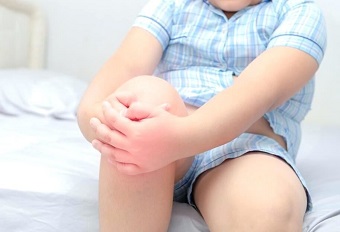
Many children suffer from knee pain at night during and following growth spurts.
Essentially what can happen during a growth spurt is that the leg bones grow faster than the leg muscles can lengthen.
This places a great deal of tension through the muscles and tendons which can then start to pull on the bone, causing knee pain which is typically worse at night.
Growth spurts occur most frequently between the ages of 3-5 and 8-12 years. One of the best remedies is stretches, both for treating and preventing growing pains.
Why Does Knee Pain Get Worse At Night?
Many people find they have more knee pain at night than they do during the day. There’s nothing more frustrating than climbing into bed at the end of a busy day, feeling exhausted and then suddenly “boom”, your knee pain kicks off with a vengeance. You’ve soldiered on through the day, done all the things you needed to do, finally have the chance to give your knees a break, and that’s when they really start to hurt. But why?
There are a number of theories out there as to why knee pain gets worse at night time:
1. Lack of Distractions
During the day, there’s lots going on, our minds are distracted by other things and we often don’t have time to notice or think about pain.
But when we climb into bed, with less stimulation and diversions to distract us, the pain that has been grumbling away in the background suddenly gets very loud as there is nothing masking it. There’s less to take our minds off our pain and the more we think about it, the more conscious we are and the more knee pain at night we feel.
2. Sleep Deprivation
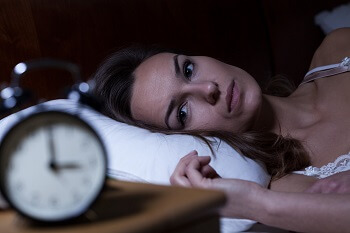
Night time knee pain can quickly become a vicious cycle. Sleep deprivation has been found to increase sensitivity to pain, decrease pain thresholds, impair healing, reduce tolerance levels and increase fatigue.
As these feed into each other, pain levels increase and the cycle continues and knee pain at night gets progressively worse and worse.
3. Carbon Dioxide and Blood Vessels
When we breathe, we draw in oxygen from the air, and then expel carbon dioxide. When we sleep our respiratory rate, the number of times we breathe in and out per minute, drops and we breathe more slowly.
As a result, the level of carbon dioxide in our blood increases which causes blood vessels to dilate - widen in diameter. This can put pressure on surrounding nerves, making them more sensitive which can lead to knee pain at night.
Treating Knee Pain At Night
There are a number of things you can do to help relieve knee pain at night such as gentle exercises or over the counter medication and home remedies such as ice or heat packs, relaxation and deep breathing.
The best treatments for knee pain at night are:
- Ice or Heat Packs: Knee ice wraps typically work better in the short term following an injury, heat pads tends to be better with longer term conditions. Use them for 10-20 minutes before going to bed.
- Elevate Your Legs: Rest with your legs elevated up on cushions or pillows for around 20 minutes before bedtime. This helps to reduce any swelling in the knee. Elevation is most effective when you are lying down with your knee resting higher than the level of your heart.
- Find A Comfortable Sleep Position: If you sleep on your side, try placing a pillow between your knees, if you sleep on your back, try placing a pillow underneath your knee. Make sure you have a good, supportive mattress.
- Take A Warm Bath Before Bedtime: Not only is it relaxing, it also helps to soothe aching joints
- Try Relaxation Techniques: Listen to relaxing music, use visualization techniques, deep breathing or try a meditation app – my favourite is Headspace
- Take Medication: Talk to your doctor about over the counter pain relief and anti-inflammatories, or whether you need something stronger. Make sure you take your medication around 30 minutes before going to bed to allow the analgesic effects to kick in before you settle down to sleep. If knee pain is waking you up during the night, talk to your doctor about switching to slow-release medication to help you sleep through until morning
- Prioritize Healthy Sleep Habits: ban electronics from the bedroom, have a consistent bedtime and wake up time, plan to get a full 8-hours, try black out shades, and avoid stimulants such as caffeine in the afternoon and evening
- Try A Topical Analgesic: If you don’t want to, or can’t, take oral medication, talk to your doctor about topical analgesics such as Biofreeze. There are a whole range of gels, creams, sprays and patches that can be applied directly to your knee. They soak through the skin directly to the knee joint to help reduce pain and inflammation
- Take Regular Rests: give your knees a break regularly during the day, preferably with your legs elevated to reduce any swelling
- Wear Compression Wraps: during the day e.g. tubigrip or elasticated knee sleeves to reduce swelling and support the knee NB don’t wear them overnight
- Use Walking Aids: If you are getting knee pain during the day, try using a stick or crutches to reduce the pressure and stress on your knees so the pain doesn’t build up
- Have a Massage: Either during the day or before bedtime to help to relax you and reduce pain levels
- Try Supplements: Talk to your doctor about whether any natural supplements, such as omega-3, SAM-e and feverfew, might help to reduce your knee pain at night, particularly if you have arthritis
- Don’t Smoke: smoking affects blood circulation which decreases healing time following an injury
- Stretch: before going to bed and when you first wake up. Not only do stretches this help to relieve tension in the muscles, it also helps improve the blood flow
How To Prevent Knee Pain At Night
The best way to deal with knee pain at night is to stop it from developing in the first place – prevention is better than cure! There are a number of things you can do during the day to reduce your risk of developing knee pain at night:
- Keep healthy with a combination of a good diet, healthy weight and regular exercise can all help to prevent nocturnal knee pain
- Warm up before & cool down after physical activity
- Do exercises to strengthen and stretch the leg muscles regularly
- Avoid activities that put extra stress on the knee joints e.g. heavy lifting, repetitive jumping and squatting
- Choose supportive, cushioned, flat footwear to relieve the pressure going through the knees
- Wear knee braces if you are getting pain when playing sports
- Exercise regularly. As well as strengthening your knees it helps reduce stress and produces endorphins – natural painkillers
Frequently Asked Questions
What Causes Burning Knee Pain At Night?
What Causes Burning Knee Pain At Night?
The most likely cause of burning nocturnal knee pain is gout knee. Other possible causes of knee burning at night include knee bursitis, nerve pain, ligament tear, hip bursitis and knee cartilage injury .
Why Do I Get Throbbing Knee Pain At Night?
Why Do I Get Throbbing Knee Pain At Night?
A throbbing pain in the knee is usually caused by a problem in the blood vessels such as venous hypertension, popliteal aneurysm or a DVT. If you get a throbbing pain in your leg, seek medical attention.
What Causes Stabbing Knee Pain At Night?
What Causes Stabbing Knee Pain At Night?
A stabbing pain in the knee at night is usually caused by something getting stuck or squashed in the knee joint, such as a cartilage tear or arthritis, or tendonitis.
Why Do I Get Knee Pain Only At Night?
Why Do I Get Knee Pain Only At Night?
Knee pain that only comes on at night, not during the day, should always be taken seriously, particularly if it is coupled with weight-loss and generally feeling unwell as it could indicate a serious underlying medical condition such as cancer.
Knee Pain At Night Summary
Knee pain at night can be caused by various factors, including arthritis, bursitis, gout, and tendonitis. Treatment depends on the cause of the knee pain but typically includes rest, physical therapy, icing the knee, exercises, medications to reduce inflammation and pain, and, in some cases, injections or surgery.
Don't feel you have to just put up with knee pain at night, go and get it checked out by your doctor and you will soon be on your way to a good night's sleep.
You may also be interested in the following articles:
- Front Knee Pain
- Pain Behind The Knee
- Knee Pain Running
- Knee Pain With Squats
- Burning Knee Pain
- Sharp Knee Pain
- Home Remedies For Knee Pain
- How To Do Stairs Without Knee Pain
Related Articles
References
1. Arthritis Care & Research, American College of Rheumatology. Sleep Disturbance in Osteoarthritis: Linkages with Pain, Disability and Depressive Symptoms. P. Parmelee, C. Tighe and N. Dautovich. March 2015
2. Arthritis Foundation: Sleep and Pain
Page Last Updated: 26th September, 2024
Next Review Due: 26th September, 2026
